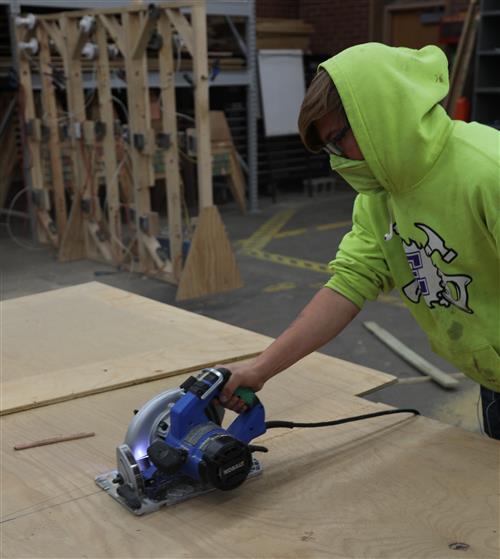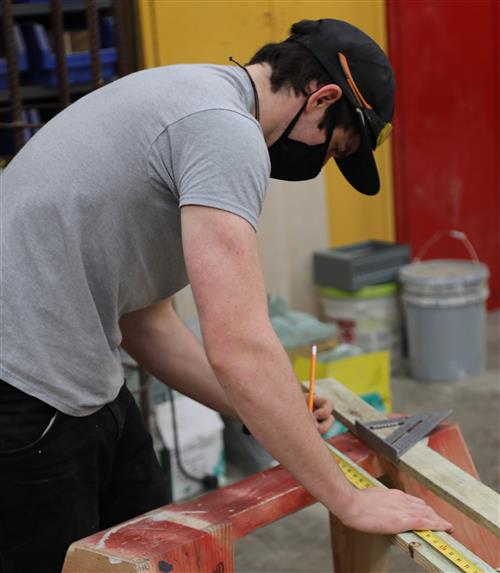Construction Trades
Page Navigation
- Erie High School
- Overview
-
Construction Trades


-
Construction Trades Video
Pathway: Engineering and Industrial Technology
Instructors: Mr. Mike Trippi (8 years) and Mr. Daryl Herman (13 years)
CIP Code 46.9999
Certifications: OSHA 10, S/P2, NCCER Core, Pre-apprenticeship for Carpenters International Training Fund (pending)
Introduction – Program of Study
Construction workers are employed in the construction industry and work predominantly on construction sites. They are typically engaged in aspects of the industry other than design or finance. The term includes general construction workers, also referred to as laborers or specialized trade members such as electricians, carpenters, and plumbers. The construction and building environment sector cover a wide range of work, from more familiar activities like installing windows, fitting carpets and mending broken water pipes, to installing solar panels and creating new structures around the world. Different jobs in the construction industry need different skills. Operatives and craftspeople need practical hand skills for using tools and machinery as well as skills in communication, teamwork, problem-solving, numeracy and the ability to work with deadlines.
This program of study prepares individuals for a variety of trade areas, including carpentry, masonry, plumbing, heating, electrical, and painting and decorating. Carpenters construct, erect, install, and repair structures and fixtures made from wood and other materials. As part of a single job, they might frame walls and partitions, put in doors and windows, build stairs, install cabinets and molding, and complete many other tasks. Each carpentry task is somewhat different, but most involve the same basic steps. By working from blueprints or instructions from supervisors, carpenters first perform the layout, measuring, marking, and arranging materials, in accordance with local building codes. They cut and shape wood, plastic, fiberglass, or drywall using hand and power tools.
Bricklayers build and repair walls, floors, partitions, fireplaces, chimneys, and other structures with brick, precast masonry panels, concrete block, and other masonry materials.
Plumbers install and repair water pipes, waste disposals, drainage, and gas systems in homes, commercial and industrial buildings. Plumbers also install plumbing fixtures in bathtubs, showers, sinks, and toilets, and appliances such as dishwashers, water filtration systems, and water heaters.
Heating, air conditioning, and refrigeration technicians install, maintain, and repair systems that control the temperature, humidity, and the total air quality in residential, commercial, industrial, and other buildings.
Electricians specializing in construction primarily install and maintain electrical and power Revised July 2013 2
systems in homes and businesses. They install and maintain the wiring and control equipment through which electricity flows.
Painters apply paint, stain, varnish, and other finishes to buildings and other structures. They select the right paint or finish for the surface to be covered, taking into account the durability, ease of handling, method of application, and customers' wishes. Paperhangers cover walls with decorative coverings made of paper, vinyl, or fabric. When necessary, they patch holes and take care of other imperfections before hanging the new wall covering.
Assumptions of this Program of Study
High-quality programs should meet the following standards:
- Promote positive working relationships.
- Implement a curriculum that fosters all areas of skill development
- Use appropriate and effective teaching approaches.
- Provide ongoing assessments of student progress.
- Employ and support qualified teaching staff.
- Establish and maintain relationships and use resources of the community.
- Provide a safe and healthy learning environment.
- Implement strong program organization and supervision policies that result in high-quality teaching and learning.
- Integrate academic skills and aptitudes necessary for postsecondary education, gainful employment and a foundation of lifelong learning.
CIP Code 46.9999 Construction Trades, Other
This is an instructional program that prepares individuals to apply technical knowledge and skills in the erection and installation of buildings and other structures using assorted materials such as metal, wood, stone, brick, glass, concrete and composition substances. Instruction is provided in the basic skills of carpentry, masonry, plumbing, heating, electrical, painting and decorating and a variety of activities associated with building construction. Some of these activities include but are not limited to blueprint reading; cost estimating; the use of a variety of hand and power tools; cutting, fitting, fastening and finishing various materials; and applying technical specifications and knowledge concerning the physical properties of materials.

